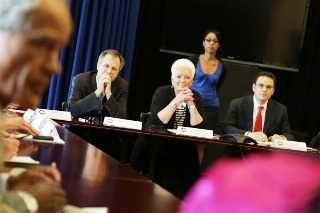U.S. advocacy groups join campaign to end Jonglei violence
July 27, 2013 (JUBA) – American advocacy groups and non-governmental organisations have tasked the U.S. and its allies around the world to help end the recurring violence in South Sudan’s largest state of Jonglei.

The White House meeting, according to a statement extended to Sudan Tribune, also discussed the humanitarian and human rights crisis in the region, and how best partners can work towards its end.
“A significant portion of the conversation focused on what the United States and its partners can do to address disturbing reports of human rights abuses, attacks on civilians, and ethnically motivated violence taking place in Jonglei, including reports that elements of the Sudan People’s Liberation Army have been complicit in the abuses,” it reads in part.
We also discussed a looming humanitarian crisis, it added.
Advocacy groups, at the meeting, vowed to work with partner countries, humanitarian organizations, advocacy groups, and others in order to end the crisis in the region and avail aid to the needy.
Meanwhile, the U.S. reiterated its strong commitment to promote peace and prosperity in Sudan and South Sudan, saying it would continue to encourage the latter in efforts to achieve the vision laid out at its independence, two years ago.
Gayle Smith, the US national security staff senior director for development and democracy and Steve Pomper, the senior director for multilateral affairs and human rights organised the White House meeting.
$20 APPEAL
The United Nations World Food Programme (WFP) has launched a campaign to raise $20 million to assist 60,000 people affected by violence in Jonglei state’s Pibor county.
The agency, in a statement issued Monday, said while it was already providing assistance to those displaced by violence in Pibor, the surge in numbers as a result of renewed violence in the area meant that it now requires additional funding to cover increased food and logistical costs.
Fighting between state and non-state actors, as well as inter-communal violence between the rival Lou Nuer and Murle communities has led to the displacement of thousands of people.
Insecurity as well as recent heavy rains, have reportedly made many roads impassable, making it more difficult to reach the population in need of assistance.
(ST)

